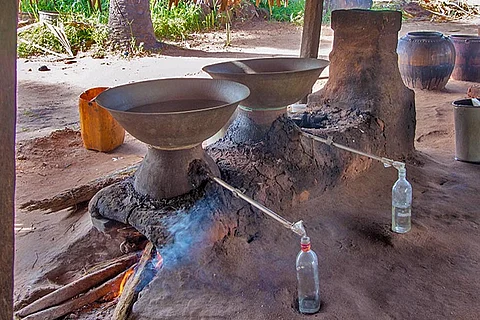

Until a few months ago, Chandran was a busy man. About six kilometres from a small village in Kasaragod district, along the Kerala-Karnataka border, stood a small shed where Chandran distilled arrack (country alcohol) from cashew apple, jaggery and other ingredients for taste. Locals, including those who owned rubber plantations in the area, would rush to his small shop in the evenings, to savour his drinks and to taste Chandran’s special wild boar meat fry (which made him even more popular). However, his shop was shut after he was arrested in an excise raid.
Last February, another man was arrested after distilling arrack on an open jail property in broad daylight in Thiruvananthapuram. In January, a junior health inspector was also arrested for distillation.
Kerala's drinking fantasies have always involved this local liquor, and it has prominently figured in popular culture with actor Mohanlal glorifying 'nadan vaattu charayam' (locally distilled arrack) in many of his hit movies. Though the state banned arrack in 1996 (AK Antony government), 23 years later, it is still a popular alcoholic drink in Kerala.
In fact, the data by the Kerala Excise Department shows that over the years, there has been no decrease in the quantity of arrack and wash (a fermented solution used to make arrack) that they seize. Excise officials say that in most cases, distillation happens in a house.
In 2016, 1,76,381 litres of wash and 4,105 litres of arrack were seized and destroyed by the department. In 2018, the department seized 2,38,811 litres of wash and 3,889 litres of arrack. In 2019, till the month of July, 1,19,949 litres of wash and 2,175 litres of wash were seized as part of raids.
According to Sam Christy Daniel, Additional Excise Commissioner (Enforcement), there is a growing trend of arrack distillation on a small scale.
“The trend of arrack distillation has increased because the techniques to prepare it are easily available on the internet these days. Earlier, distillation took place in remote areas, near forests, at a large scale. But these days, people do it at home for personal use. That is why it is difficult to locate such centres,” he said.
Last week, in Palakkad, excise officials seized 800 litres of wash on the first floor of a house. The house had all the modern machinery to distill the arrack. One of the officers, who sought anonymity, told TNM that nobody would have thought that arrack distillation was happening in that house.
"Since the price of foreign liquor has increased, some find distillation of arrack as an alternative. They are distilling arrack for domestic purpose,” VP Sulesh Kumar, Excise Deputy Commissioner, Palakkad, told TNM.
An excise officer from the northern part of Kerala, on the condition of anonymity, said that they would find arrack distillation going on in many of the tribal colonies but that they wouldn't take any action against them.
“They distill it for themselves at home, as they cannot afford foreign liquor. Moreover, they have to walk kilometres to reach a state beverages outlet. They prepare arrack using fruits, sugar or jaggery, coconut flower etc. We don't file any cases against them,” he said.
Madhu, an Excise Circle Inspector from Hosdurg taluk in Kasaragod, said that large-scale distillation units in rubber plantations, too, are common, even after so many raids.
"During the season of cashew apple, arrack distillation increases. During Onam, we had arrested a few for running distillation units in plantations,” he said.
Arrack is a cheap and unrefined form of liquor, which can double the ill-effects caused due to refined liquor. Moreover, the fermented ingredients in arrack can be dangerous, too.
Sam added that though arrack is harmful to health, drinking it will not end in a 'hooch tragedy’ unless it is spiked. He noted that arrack is generally not laced with spirits or other additives, but that arrack in its crude form - that is, a non-distilled version - can affect one’s health, including the liver.
Dinesh (name changed), a planter and a specialist in distilling arrack using cashew apple, pineapple and some grains, said that the production quality and ingredients also matter. “Earlier, some used to add batteries and insects for an added buzz. These days, these liquors are being distilled using fruits and cardamom,” he shared.
Main image courtesy: 'Hot Toddy' by Dunphasizer [CC BY-SA 2.0]